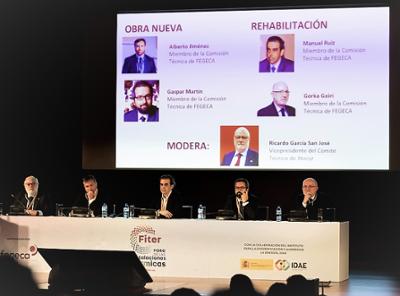

FITUR gathered over 250 attendees to debate on the energy situation of buildings

Cibeles Palace (CentroCentro auditorium) hosted the first Forum on Thermal Installations, FITER, which brought together more than 250 attendees to discuss the energy situation in Spain at round tables and talks of national and European interest. The event was closed by Joan Groizard, general director of IDAE.
Organized by FEGECA (Association of Heat Generator and Distribution Manufacturers) on the occasion of its 40th anniversary, the Forum had the participation of Pau García Policy Officer. Directorate-General for Energy Efficiency in the European Union, who went over the new points in the revision of the Energy Performance for Buildings Directive that, once it is passed in late 2022 or early 2023, as he revealed, will have a period of 2 years to be transposed in each member state. "The events over the last few months have underscored the need to speed up the changes to reach the goals for neutral carbon emissions. Reducing Europe's energy dependency has become a key issue", he noted.
The Ministry for Energy transition and Demographic Challenge (MITECO) was represented by Jacobo Llerena, Assistant General Manager of Energy Efficiency, who discussed the content of the regulation on the System of Energy Savings Certificates (CAEs) his department is working on. It involves an instrument to help reach the goal of final accumulated energy savings by 2030 and develop a tractor and multiplier effect in the energy savings market. "this CAE system will help transform the energy model by putting more weight on the private sector; it will energize employment and competitiveness; and it will make it possible for final consumers to invest in energy efficiency with greater confidence", Llerena explained.
The current Spanish and European codes and standards in the heating industry seek to increase sustainability and strengthen decarbonization, taking into account the global goals for 2030 and 2050. Thus, the President of FEGECA, Vicente Gallardo, expressed that "our industry needs to lead the way in energy efficiency. Around 45% of the buildings in Spain are from before 1980 and there are 9.7 million homes that need a tune-up". He added that decarbonizing does not necessarily mean electrifying: "Electric solutions will in many cases be the best option, but in others, it will not be possible. Nevertheless, the sector is already prepared to offer innovative alternatives for such situations".
Solutions for decarbonization
At FITER there was plenty of room for different technologies and every energy vector (air-source, geothermal, solar thermal, photovoltaic, biomass, renewable gasses, hydrogen, etc.). Experts in each area analyzed and compared the various different solutions of combustion, electrical and solar for decarbonization.
Biomass, renewable gasses, and hydrogen are some of the fuels for the future that citizens are largely unaware of. To analyze the potential of these energy sources, the first round table on combustion solutions included the participation of Antonio González, vice president of AeH2; Germán Medina, president of the Sedigas Renewable Gas Committee; and Javier Díaz, president of Avebiom.
These experts shared the opinion that Spain possesses excellent conditions for decarbonizing quickly and effectively, but it needs institutions and legislation to be more ambitious as well as better coordination between the public and private sectors. "Taking up a single strategy for decarbonization would be a mistake. The variety of alternatives is necessary to cover the complete demand and to offer the best solution for each specific situation", they commented.
Another change underway in the energy model is by implementing electrical solutions. This was the topic discussed at the second round table. The Basque Government, represented by Antton Arrieta, head of Industrial Administration in the Industrial Safety area at Eusko Jaurlaritza, and the City of Madrid, with the participation of Fernando del Valle, Head of the Clean Technologies Department (Government Area on the Environment and Mobility) advanced some of the energy matters being worked on at their respective regional and local administrations.
"Even though it's being encouraged to replace installations, there are many buildings that are not ready to take on such projects, partly because the change is focused mostly on implementing electrical solutions, which do not fit every case, especially in existing buildings with older facilities", they argued. Therefore, they explained that the solutions should be varied and adapted to the typology of each dwelling and the specific climate in each zone. "Here is where thermal installations come into their own, by providing smaller, more adaptable systems", they added.
The third round table was oriented to looking for solar-based solutions for decarbonization. Sonia Pomar, General Secretary of FEGECA, and Paula Santos, director of Self-consumption and Energy Communities at UNEF analyzed the advantages of solar thermal and solar photovoltaic, respectively. One technology does not exclude the other, they clarified. By hybridizing solar energies with other energy sources, buildings can boost their performance and adjust their consumption curves. "With their small carbon footprint, solar solutions will play a fundamental role in the decarbonization of buildings, especially ones already built; society is hugely interested in these sources and the high demand of requests for help for installing them is proof of it", the experts asserted.
Real, feasible solutions
FITER also sounded out the experts' point of view by posing practical cases on real, feasible solutions in the residential and service sectors, both for new builds and for refurbishments. Alberto Jiménez, Manuel Ruíz, Gaspar Martín y Gorka Goiri, members of the FEGECA Technical Commission, explained to attendees what the best technology is for each specific case, and they summarized the UNE codes and standards that ensure their quality.
According to these experts, "the trends for the future look for the most efficiency possible and they tend toward zero emissions. They are based on multi-technology: these are custom-tailored solutions that require professionals with a solid technical background to find the best answer for each specific case".
After a few words from Vicente Gallardo, president of FEGECA, who thanked everyone for making the event a success and the interest shown by the industry from the first day the event was announced, the Forum was concluded by Joan Groizard, the general director of IDAE, a collaborating organization of the event. He noted that "the great challenge is to speed up renewables, mobility, and the use of thermals. The leap to renewables is already a reality, but society still needs to internalize the advantages of these energy sources".
"We are at a key moment for decarbonization, although we have run up against a war that has made our dependence on foreign energy manifestly clear, the energy transformation is a social and economic necessity, not just an environmental one", IDAE's general director concluded.




